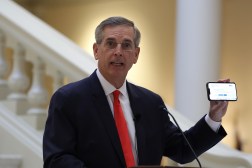DNC to Silicon Valley on disinformation: do better
The Democratic National Committee is calling on companies including Facebook, Twitter, and Google to step up their efforts to protect against disinformation on their platforms in the buildup to the 2020 presidential elections.
The DNC’s recommendations, which it issued Monday, range from platforms promoting authoritative news outlets to establishing policies to prevent the automated spread of disinformation. The DNC is also calling on the companies to take a harder line against state-backed media, and to share more details about disinformation campaigns online to try enhancing the research community’s ability to understand political disinformation.
“While progress has been made since the 2016 elections, platforms still have much to do to reduce the spread of disinformation and combat malicious activity,” the DNC writes.
The recommendations show the Democratic Party, just a little over two months before the Iowa Democratic caucuses, rallying behind the idea that tamping down disinformation can help ensure a political process devoid of foreign interference like the kind that befell the DNC in 2016.
The Democrats have increasingly been willing to apply pressure to tech firms for their actions — or lack thereof — in perpetuating disinformation campaigns. Last month, DNC CEO Seema Nanda railed on Facebook about its approach to regulating trolls on its platform in a letter, which CyberScoop obtained.
The letter, addressed to Facebook CEO Mark Zuckerberg, criticizes Facebook’s ability to call out disinformation despite its hefty coffers, while touting the DNC’s own operation to unearth disinformation campaigns online, according to the letter, which CNN first reported. Over the course of nine months, the DNC’s counter-disinformation unit unearthed nine disinformation campaigns, Nanda pointed out.
“It’s concerning that we’re able to uncover these terms-of-service-violating operations on a fairly regular basis, with a team far smaller than Facebook’s,” Nanda wrote, according to the letter.
The DNC’s counter-disinformation team, led by Bob Lord, the chief security officer for the DNC, is working with campaigns on counter-human intelligence training and disinformation training to develop a culture of calling out suspicious behavior when its observed. The team is also using commercial and custom-built tools both to track trending content online and possible manipulation related to Democratic candidates.
The DNC recommends campaigns and state parties mirror this by establishing a counter-intelligence lead to monitor candidate social media traffic and to set up internal paths to report suspicious behavior.
Recommendations for the platforms
Moving forward, the DNC recommends that Facebook, Twitter, and YouTube make authenticity and transparency king, such as by labeling state-controlled media content and promoting authoritative news over highly engaging or inflammatory news that tends to be shared on social media newsfeeds. The DNC also wants platforms to keep high of mind transparency in account use.
“Requiring social media users to be honest and transparent about who they are limits the ability of bad actors to manipulate online discourse. This is especially true of foreign bad actors,” the DNC writes. “Platforms choosing to allow anonymous accounts should consider incentivizing transparency in content algorithms.”
To root out state-backed misinformation, the party recommends terminating ad partnerships with state-controlled media. While Twitter has banned state-controlled media ads, YouTube and Facebook have not. Twitter, on the flip side, has not established practices to label content from state-controlled media.
In an effort to boost research around disinformation, the DNC is further recommending the platforms to release details about state-backed disinformation campaigns more fully — while Twitter has disclosed state-backed campaigns in full, Facebook and Google’s YouTube only provide details through third party analysis or samples of disinformation.
“While platforms have been reluctant to evaluate the truthfulness of content on their platforms, it’s critical that these platforms acknowledge disinformation when it appears,” the DNC writes.






